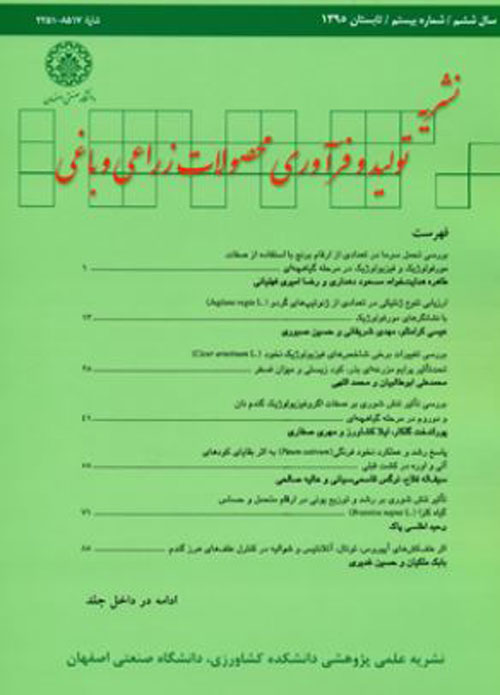The Effect of Salicylic Acid Application on Reducing the Effect of Cold Stress Due to Delayed Planting in Rapeseed Genotypes (Brassica napus L.)
In order to investigate the effect of salicylic acid application on reducing the effects of cold stress due to delayed planting in rapeseed genotypes, this experiment was conducted as a factorial-split plot during the 2014 and 2015 growing seasons in the Faculty of Agriculture, University of Zanjan, Iran. Interaction of the sowing date (11th September and 7th October) and salicylic acid (control (spray with distilled water), 250 µM and 500 µM) were as the main-plot and rapeseed genotypes (Karaj-3, L14, Okapi, Zarfam) were assigned to subplots. The effect of planting date* salicylic acid* genotype on winter survival percentage, grain yield and its components, harvest index, and biomass was significant. Delayed planting reduced survival percentage of all rapeseed genotypes; but the severity of reduction varied depending on the genotype. It was also found that the decrease in survival percentage due to delay in planting can be partially compensated for by the use of salicylic acid, which varied depending on the salicylic acid concentration and genotype. Delayed planting date reduced grain yield in all genotypes and salicylic acid application had the opposite effect and increased grain yield. Karaj-3 had the highest grain yield on 7th October planting date and 500 µM salicylic acid, while Zarfam had the lowest grain yield on 11 September and 0 µM salicylic acid. Application of salicylic acid compensated for part of the reduction in yield due to delay in planting, so that the lack of application of salicylic acid and the use of 250 and 500 μM salicylic acid in planting on 7 October caused grain yield reduction in Karaj-3 genotype by 36, 31 and 18% respectively, compared to 11 September, while grain yield in L14 genotype showed 26, 21 and 8% reduction respectively, compared to 11 September planting date. The grain yield of Zarfam genotype at delayed planting date decreased by 9% and 5% and increased by 13%, respectively, in conditions of non-application and application of 250 and 500 μM salicylic acid compared to the 11 September planting date. There was a positive significant correlation between grain yield components and winter survival percentage. Although delayed planting reduced grain yield, yeld components, harvest index, and biomass in all genotypes, the severity of the decrease varied among the genotypes. Consumption of salicylic acid moderated the effect of delay in planting and this modulatory effect was higher in the application of salicylic acid with a concentration of 500 μM than 250 μM. In general, the results showed that in both planting dates, the Karaj-3 genotype had the highest grain yield in all salicylic acid levels, so it is recommended for planting in areas with similar conditions.
- حق عضویت دریافتی صرف حمایت از نشریات عضو و نگهداری، تکمیل و توسعه مگیران میشود.
- پرداخت حق اشتراک و دانلود مقالات اجازه بازنشر آن در سایر رسانههای چاپی و دیجیتال را به کاربر نمیدهد.



